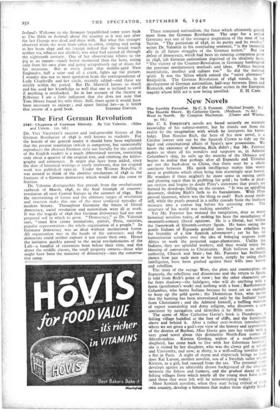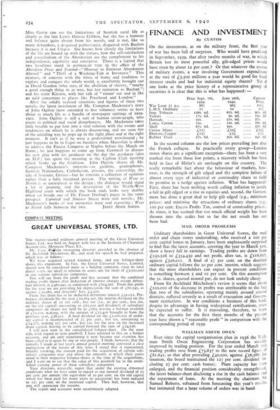New Novels
MR. C. S. FORESTER'S novels are based securely on accurate knowledge of his subject-matter, but he stands out from the realist by the imagination with which he interprets his know- ledge. Don Narciso Rich, the hero of his new novel, is a Catalan lawyer sent out by the Spanish Crown to tidy up the legal and constitutional affairs of Spain's new possessions. We know the existence of America, Rich didn't ; but Mr. Forester makes us share all his wonders and suspense as, in Admiral Columbus's ship, he sails up the mouths of the Orinoco and begins to realise that perhaps after all Espanola and Trinidad are not the back-door to China, that there may be a whole continent between. His quick intelligence makes him worry away at problems which often bring him alarmingly near heresy. He wonders if there mightn't be more sense in raising cattle and planting sugar than in grubbing for gold ; he looks at deep- sea oysters and begins to doubt Pliny's statement that pearls are formed by dewdrops falling on the oysters. " It was an appalling discovery, shaking Rich's faith to its foundations. With Pliny proved incorrect, where was the thing to end? Rich stood stock- still, while the pearls poured in a milky cascade from the leathern measure into a canvas bag before his unseeing eyes. The structure of his world was rocking unstably." Yet Mr. Forester has resisted the temptation, dear to many historical novelists today, of making his hero the mouthpiece of twentieth-century liberal opinions. He is a liberal, but within the framework of fifteenth-century Spain. He hates seeing the gentle Indians of Espanola goaded into hopeless rebellion by the brutality of a few Spanish adventurers ; yet he has no humanitarian scruples over the idea of bringing negroes from Africa to work the projected sugar-plantations. Unlike the Indians, they are splendid workers, and they would enjoy the blessing of conversion to Christianity. Rich believes in order, authority, Church and State ; but Mr. Forester has brilliantly shown how just such men as he must, simply by using their intelligence, have been pushed against their wills into heresy and rebellion.
The story of the voyage West, the plots and counterplots on Espanola, the rebellions and dissensions and the return to Spain, is told from Rich's point of view ; but the other characters are far from shadowy—the hidalgoes, who will do anything with a horse (gentleman's work) and nothing with a boat ; Bartholomew Columbus, who burns Indians because he must set an example to keep up the gold quota ; the Dominican friar, who insists that the burning has been necessitated only by the Indiana' lapse from Christianity ; and the Admiral himself, a baffling mixture of expert seamanship and dotty religion, who discovers a new continent by navigation and identifies it by Bible texts.
The scene of Miss Catherine Gavin's book is Dundargue, a fishing village huddled at the foot of cliffs, and the farmlands
above and behind it. After a rather over-written introduction,
where we are given a god's-eye view of the history and appearance of the district of Buchan, Miss Gavin gets into her stride with a
very good novel about this distinctive North-East corner of Aberdeenshire. Kirsten Gordon, widow of a south-country shepherd, has come back to live with her fisherman brother;
she is visited by her daughter, who was the clever girl at school and University, and now, at thirty, is a well-selling novelist with a flat in Paris. A night of storm and shipwreck brings to their door Kai Larsen, another novelist, son of a Swedish sailor whom Kirsten, as a girl, had rescued from the sea. The personal story develops against an admirably drawn background of the rivalries between the fishers and farmers, and the gradual decay of the fishing villages from which nearly all the young men have rile (and those that were left will be minesweeping today). Most Scottish novelists, when they start being critical of their own country, develop a bitterness that makes them slightly blind. Miss Gavin can see the limitations of Scottish rural life as clearly as the late Lewis Grassic Gibbon, but she has a humour and balance quite absent from his novels, and is not, like so many debunkers, a disguised perfectionist, disgusted with Buchan because it is not Utopia. She knows how closely the limitations of the life are bound up with the virtues, how the self-satisfaction and parochialism of the Aberdonian are the complement to his independence, capability and enterprise. There is a legend that two headlines stand in permanent type in the office of the Aberdeen Press and Journal-" Honour to Eminent Aberdonian Abroad " and " Theft of a Washing-Tub at Inverurie." This mixture, of concern with the trivia of home and readiness to explore and conquer the whole world, is excellently brought out in David Gordon (who says, of the abolition of slavery, "maybe a good enough thing in ae wye, but fair ruination to Buchan ") and his sister Kirsten, with her talk of " rinnin' oot and in like an auld concertina to places like Peterhead and London." After the solidly realised situations and figures of these two novels, the latest instalment of Mr. Compton Mackenzie's story of John Ogilvie (now extended to five volumes) seems to have about as much life as a bundle of newspaper cuttings of 1919- 1922. John Ogilvie is still a sort of human seismograph, who reacts to political and social disturbances. Mr. Mackenzie takes little trouble to put him into a vital relation with the events and tendencies on which he is always discoursing, and we soon tire of the unfailing way he pops up in the right place and at the right moment. It isn't as if he were a professional newshound ; he just happens to be in Capri on business when Mussolini is about to address the Fascist Congress at Naples before the March on Rome ; he just happens to come up from Cornwall to discuss his new play with his producer on the day the producer (also an M.P.) has spent the morning at the Carlton Club meeting which broke up the Coalition. John Ogilvie shares all Mr. Compton Mackenzie's interests-in gardens, gramophones, Scottish Nationalism, Catholicism, prisons, the censorship, the sale of honours, Greece-but he remains a collection of opinions rather than a fully imagined person. The writing of West to North is as uninspired as the design ; the dialogue would stand a lot of pruning, and the description of the North-West Highland coast with which the book ends looks very shabby when set beside one of Dr. Fraser Darling's pages in the same prospect. Carnival and Sinister Street were real novels ; Mr. Mackenzie's books of war memories were real reporting ; West to North falls between the two. JANET ADAM SMITH.



























 Previous page
Previous page